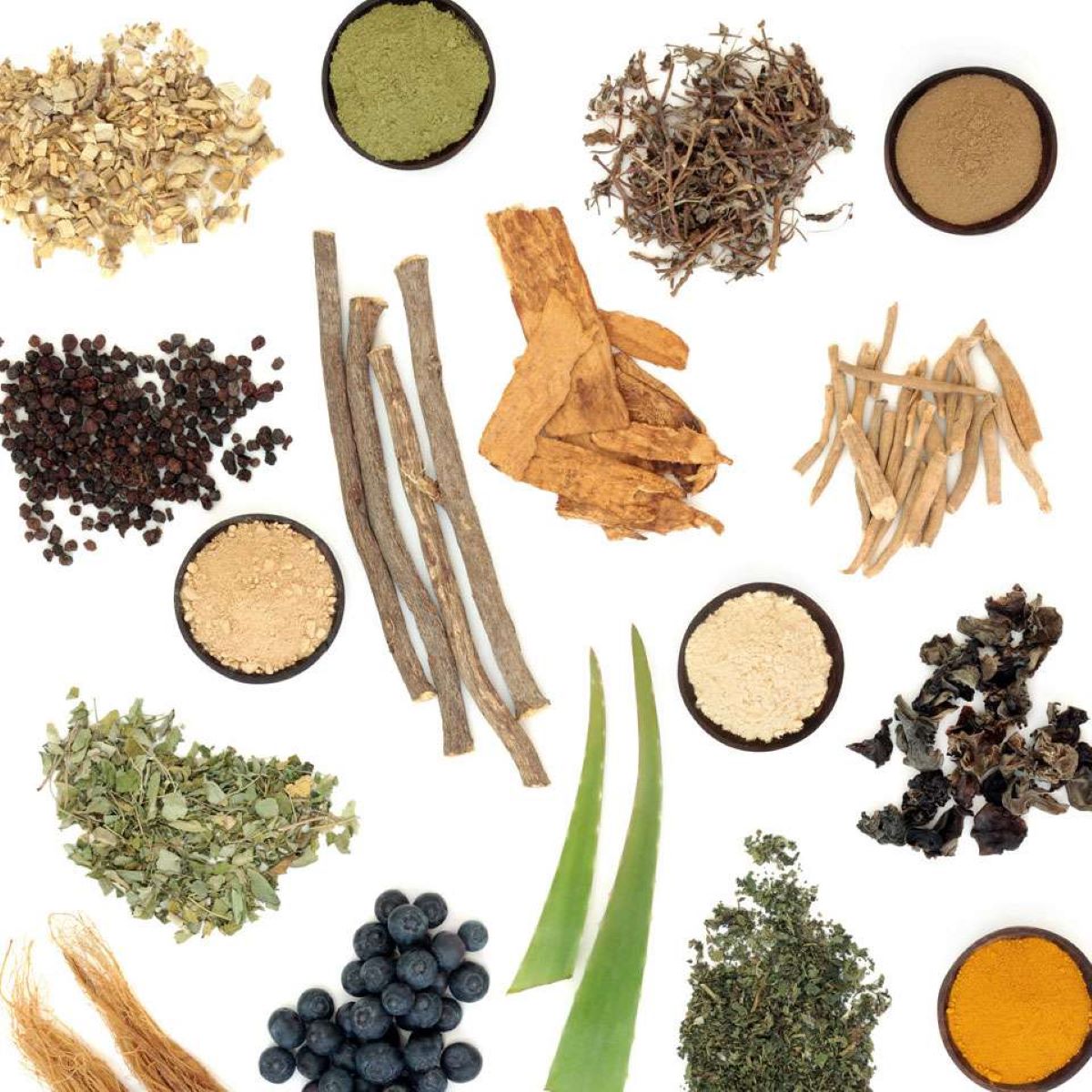Home>Types of Gardening>Edible Gardening>What Are Adaptogenic Herbs


Edible Gardening
What Are Adaptogenic Herbs
Published: September 29, 2023
Discover the benefits of edible gardening with adaptogenic herbs. Learn how these powerful plants can promote balance and well-being in your daily life.
(Many of the links in this article redirect to a specific reviewed product. Your purchase of these products through affiliate links helps to generate commission for Chicagolandgardening.com, at no extra cost. Learn more)
Table of Contents
Introduction
Adaptogenic herbs have gained significant popularity in recent years for their remarkable health benefits and ability to promote overall well-being. These powerful botanicals have been used for centuries in traditional medicine practices, particularly in Ayurveda and Traditional Chinese Medicine.
But what exactly are adaptogenic herbs? In simple terms, adaptogens are natural substances that help the body adapt to various stressors, both physical and mental. They work by modulating the body’s response to stress, promoting balance, and supporting optimal functioning of the body’s systems.
Unlike traditional pharmaceutical medications, which often target specific symptoms or conditions, adaptogenic herbs offer a holistic approach. They support the body’s ability to adapt and restore balance, rather than targeting individual symptoms. This makes them a great complement to conventional medicine, as they can enhance the body’s resilience and help mitigate the negative effects of stress.
Adaptogens help the body adapt to various stressors by regulating our stress response system, known as the hypothalamic-pituitary-adrenal (HPA) axis. When we encounter stress, whether it’s physical, emotional, or environmental, our bodies release stress hormones like cortisol. Prolonged exposure to high cortisol levels can lead to a range of health issues, including fatigue, anxiety, and weakened immune function.
By modulating the HPA axis, adaptogens help regulate cortisol levels and restore a state of balance, known as homeostasis. This not only improves our ability to handle stress but also supports overall physical and mental well-being. Adaptogens have a unique ability to “adapt” their effects depending on what our bodies need. They can provide a calming effect when we are stressed or energize us when we are fatigued, making them incredibly versatile.
Throughout this article, we will explore the various benefits of adaptogenic herbs, how they work, popular types of adaptogens, potential side effects, and how to incorporate them into our daily lives.
Definition of Adaptogenic Herbs
Adaptogenic herbs are a group of plants that possess unique properties to help the body adapt and respond to stress. These herbs have been used for centuries in traditional medicine systems and are known for their ability to promote overall well-being and vitality.
What distinguishes adaptogenic herbs from other types of herbs is their specific action on the body’s stress response system, the hypothalamic-pituitary-adrenal (HPA) axis. Adaptogens work by regulating the release and impact of stress hormones like cortisol, helping to bring the body back into balance.
One key characteristic of adaptogenic herbs is their ability to exert a non-specific response on the body. This means that they can adapt their effects based on the specific needs of an individual, helping to restore equilibrium and support optimal functioning.
Adaptogens are also unique in terms of their safety and broad-spectrum benefits. Unlike many pharmaceutical medications, adaptogens are generally safe for long-term use and have a low risk of adverse side effects when used appropriately.
Adaptogenic herbs come from various plant families and include well-known botanicals such as ashwagandha, rhodiola, holy basil, and ginseng. Each herb has its own set of specific actions and benefits, but they all possess adaptogenic properties.
It’s important to note that while adaptogenic herbs offer numerous benefits, they are not a cure-all or a substitute for professional medical advice. They should be used as part of a holistic approach to overall health and well-being, alongside a healthy diet, regular exercise, and other appropriate lifestyle modifications.
In the following sections, we will delve deeper into the specific benefits of adaptogenic herbs, how they work, and the various types of adaptogens commonly used in traditional and alternative medicine practices.
Benefits of Adaptogenic Herbs
Adaptogenic herbs offer a wide range of benefits for both physical and mental well-being. Let’s explore some of the key advantages these powerful botanicals provide:
1. Stress Reduction: Adaptogens are primarily known for their ability to help the body cope with and reduce the negative effects of stress. They work by regulating the release of stress hormones like cortisol and promoting a calm and balanced state of mind.
2. Increased Energy and Stamina: Many adaptogenic herbs have energizing properties and can help combat fatigue and increase physical endurance. They work by boosting mitochondrial function and improving the body’s ability to utilize and produce energy efficiently.
3. Improved Mental Clarity and Focus: Adaptogens have the potential to enhance cognitive function, including memory, concentration, and mental clarity. They can support brain health by reducing oxidative stress, promoting healthy blood flow, and supporting neurotransmitter balance.
4. Enhanced Immune System Function: Adaptogens have immune-modulating properties, meaning they can help strengthen the immune system and improve its ability to fight off pathogens. They support immune cell activity, reduce inflammation, and enhance immune response.
5. Hormonal Balance: Several adaptogenic herbs have been used for centuries to support hormonal balance, particularly in relation to the endocrine system. They can help alleviate symptoms of hormonal imbalance, such as irregular periods, mood swings, and low libido.
6. Improved Sleep Quality: Some adaptogens, like ashwagandha and valerian root, have calming and relaxing properties that can help promote better sleep quality. They can help reduce anxiety, ease restlessness, and support a more restful night’s sleep.
7. Increased Resilience to Physical and Mental Fatigue: Adaptogens help the body cope with both physical and mental stressors, making them valuable for individuals who lead demanding lifestyles or engage in intense physical activities. They can support adrenal health and prevent burnout.
8. Anti-Aging Benefits: Adaptogens are rich in antioxidants, which can help neutralize free radicals and slow down the aging process. They can support healthy skin, reduce the appearance of wrinkles, and promote overall youthful vitality.
It’s important to note that the specific benefits of adaptogenic herbs can vary depending on the individual and the herb used. It’s advisable to seek guidance from a qualified healthcare professional or herbalist to determine the most appropriate adaptogens for your unique needs.
Next, we will explore some of the popular types of adaptogenic herbs and their specific effects on the body.
Popular Types of Adaptogenic Herbs
There are several adaptogenic herbs that have gained popularity for their remarkable health benefits. Let’s take a look at some of the most widely recognized and researched adaptogens:
1. Ashwagandha: Ashwagandha is an ancient Ayurvedic herb known for its calming and rejuvenating properties. It helps reduce stress, improve sleep quality, enhance cognitive function, and support overall vitality.
2. Rhodiola Rosea: Rhodiola is a Scandinavian adaptogenic herb that promotes physical and mental resilience. It can enhance energy, reduce fatigue, improve focus, and boost athletic performance.
3. Holy Basil (Tulsi): Holy Basil, also known as Tulsi, is revered in Ayurveda for its stress-relieving qualities. It helps combat anxiety, supports mental clarity, and promotes a sense of calm and well-being.
4. Ginseng: Ginseng is a widely recognized adaptogenic herb, native to East Asia. It has been used for thousands of years to increase energy, improve cognitive function, enhance stamina, and support immune health.
5. Eleuthero (Siberian Ginseng): Eleuthero is another adaptogen that is often referred to as Siberian Ginseng. It is known for its ability to enhance endurance, improve mental performance, boost immune function, and reduce fatigue.
6. Maca: Maca root is a Peruvian adaptogenic herb that primarily supports hormonal balance and energy levels. It is commonly used to alleviate symptoms of menopause, enhance libido, and improve mood.
7. Schisandra: Schisandra is a berry that is highly valued in Traditional Chinese Medicine. It has adaptogenic properties that can support energy levels, enhance mental focus and concentration, and promote overall well-being.
8. Reishi Mushroom: Reishi mushroom is a powerful adaptogen used in traditional Chinese and Japanese medicine. It supports the immune system, promotes relaxation, improves sleep quality, and has potent antioxidant properties.
These are just a few examples of the many adaptogenic herbs available. Each herb has its own unique chemical composition and set of benefits. It’s important to note that individual responses to adaptogens can vary, so it may require some experimentation to find the adaptogens that work best for you.
In the next section, we will explore how adaptogenic herbs work in the body and their potential mechanisms of action.
How Adaptogenic Herbs Work
Adaptogenic herbs exert their beneficial effects on the body through various mechanisms. While the precise mechanisms of action may vary depending on the specific herb, here are some common ways in which adaptogens work:
1. Modulating the Stress Response: Adaptogens help regulate the body’s stress response system, the HPA axis. They can influence the release and impact of stress hormones like cortisol, promoting a more balanced response to stress and reducing stress-related symptoms.
2. Supporting Adrenal Health: Many adaptogenic herbs help support the health of the adrenal glands, which play a crucial role in our stress response. By nourishing and balancing the adrenal glands, adaptogens can help improve our resilience to stress and prevent adrenal fatigue.
3. Balancing Neurotransmitters: Some adaptogens have the ability to modulate neurotransmitter activity in the brain. They can support the production and balance of neurotransmitters like serotonin, dopamine, and GABA, which are involved in mood, cognition, and stress regulation.
4. Enhancing Energy Production: Adaptogens can boost energy levels by improving mitochondrial function and increasing adenosine triphosphate (ATP) production. This can lead to increased physical energy, endurance, and mental alertness.
5. Regulating Hormones: Many adaptogens have a direct impact on the endocrine system, helping to balance hormone levels. They can support reproductive hormones, stress hormones, and other hormones that play a role in overall health and well-being.
6. Supporting Immune Function: Some adaptogens have immune-modulating properties, helping to strengthen the immune system and enhance immune response. This can make the body more resilient to infections and reduce the risk of immune-related disorders.
7. Providing Antioxidant Protection: Adaptogens are rich in antioxidants, which help neutralize harmful free radicals and protect the body from oxidative stress. This can have numerous benefits for overall health and cellular function.
It’s worth noting that the effects of adaptogenic herbs can be cumulative and may take some time to notice. Consistent use over a period of weeks or months is often recommended to experience the full range of benefits.
It’s important to consult with a healthcare professional or herbalist before incorporating adaptogenic herbs into your routine, especially if you have any underlying health conditions or are taking medications. They can provide guidance on the appropriate dosage and any potential interactions or contraindications.
In the next section, we will explore potential side effects and precautions associated with adaptogenic herbs.
Potential Side Effects and Precautions
While adaptogenic herbs are generally considered safe for most people, it’s important to be aware of potential side effects and take necessary precautions. Here are some important considerations to keep in mind:
1. Individual Sensitivities: Every person is unique, and individual responses to adaptogenic herbs may vary. It’s possible to have an allergic reaction or experience adverse effects, even with natural herbal remedies. If you are trying a new adaptogen for the first time, start with a low dose and closely monitor your body’s response.
2. Drug Interactions: Adaptogenic herbs can interact with certain medications. If you are taking prescription medications, it’s crucial to speak with your healthcare provider before incorporating adaptogens into your routine. They can advise on potential interactions and guide you on the appropriate dosage and timing.
3. Pregnancy and Breastfeeding: The safety of adaptogenic herbs during pregnancy and breastfeeding is not well-established. It’s best to consult with a healthcare professional before using adaptogens in these situations to ensure the safety of both the mother and the baby.
4. Autoimmune Disorders: Some adaptogenic herbs may have immune-modulating effects, which can further stimulate or suppress the immune system. If you have an autoimmune disorder, it’s important to consult with a healthcare professional before using adaptogens, as they may interact with your condition or ongoing medications.
5. Quality and Sourcing: The quality of herbal products can vary significantly. It’s essential to choose reputable brands or sources to ensure that you are getting high-quality and properly tested adaptogenic herbs. This can help minimize the risk of contamination or adulteration.
6. Dosage and Duration: It’s important to follow the recommended dosage guidelines for each specific adaptogenic herb. Taking higher-than-recommended doses or using adaptogens for prolonged periods may increase the risk of side effects. It’s advisable to start with the lowest effective dose and gradually increase if necessary.
7. Personal Health History: Consider your personal health history, including any chronic conditions or allergies, before incorporating adaptogenic herbs into your routine. Certain adaptogens may not be suitable for individuals with specific health concerns, such as high blood pressure, thyroid disorders, or liver conditions.
It’s always recommended to seek advice from a qualified healthcare professional or herbalist who can provide personalized guidance based on your specific needs and health status.
By taking these precautions and being mindful of your body’s response, you can safely enjoy the potential benefits of adaptogenic herbs.
In the next section, we will explore different ways to incorporate adaptogenic herbs into your daily routine.
How to Use Adaptogenic Herbs
There are several effective ways to incorporate adaptogenic herbs into your daily routine to maximize their benefits. Here are some suggestions:
1. Herbal Teas: One of the simplest and most traditional ways to enjoy adaptogens is by brewing them into herbal teas. You can find pre-packaged adaptogenic tea blends or create your own by infusing adaptogenic herbs like ashwagandha, holy basil, or rhodiola into hot water. Enjoy a relaxing cup of adaptogenic tea in the morning or evening.
2. Tinctures and Extracts: Adaptogenic herbs are also available in tincture or extract form, which can be added to water, juice, or a cup of herbal tea. Tinctures are highly concentrated, making it easy to consume a small amount to experience the desired effects. Follow the recommended dosage on the product label or consult with a herbalist.
3. Capsules and Tablets: Many adaptogenic herbs are available in capsule or tablet form for convenient consumption. This option is ideal for those who prefer a standardized dosage and easy portability. Follow the recommended dosage instructions provided by the manufacturer.
4. Powder Blends: Adaptogenic herb powders, such as maca or ashwagandha, can be added to smoothies, yogurt, or oatmeal for a nutritional boost. These powders can be easily incorporated into your daily routine and offer a convenient way to consume adaptogens.
5. Culinary Uses: Some adaptogens, like ginseng or rhodiola, can be incorporated into cooking and baking. You can add powdered adaptogens to recipes for soups, stews, energy balls, or baked goods. This allows you to enjoy the benefits of adaptogens while adding flavor and nutrition to your meals.
6. Skincare Products: Certain adaptogenic herbs, such as ginseng or reishi mushroom, are commonly used in skincare products for their antioxidant properties. Look for natural skincare products that contain adaptogenic herbs to enjoy the potential benefits for your skin.
It’s important to note that the dosage and frequency of use may vary for each adaptogenic herb. It’s advisable to start with a lower dose and slowly increase as needed, following the recommended guidelines provided by the manufacturer or consulting with a healthcare professional or herbalist.
Lastly, it’s essential to remember that adaptogenic herbs are not a quick fix solution. Consistency is key for experiencing the full benefits. Give your body time to adjust and respond to the adaptogens, and listen to your body’s needs throughout the process.
As with any supplement or herbal remedy, it’s always advisable to consult with a healthcare professional or herbalist, particularly if you have any underlying health conditions, are taking medications, or are pregnant or breastfeeding.
By incorporating adaptogenic herbs into your daily routine, you can harness their natural benefits and promote overall well-being.
Conclusion
Adaptogenic herbs offer a natural and holistic approach to promoting overall well-being and supporting the body’s ability to adapt to stress. These powerful botanicals, including herbs like ashwagandha, rhodiola, holy basil, and ginseng, have been used in traditional medicine practices for centuries.
By modulating the body’s stress response system, adaptogens can help reduce the negative effects of stress on both the physical and mental levels. They can support adrenal health, enhance energy and stamina, improve cognitive function, and boost immune system function.
It’s important to remember that adaptogenic herbs are not a cure-all or a substitute for professional medical advice. They should be used as part of a holistic approach to health and well-being, alongside a balanced diet, regular exercise, and appropriate lifestyle modifications.
When incorporating adaptogenic herbs into your routine, it’s important to consider individual sensitivities, potential drug interactions, pregnancy or breastfeeding considerations, and the quality and sourcing of the herbs. Consulting with a healthcare professional or herbalist can provide personalized guidance for your unique needs.
Whether you choose to enjoy adaptogenic herbs in the form of herbal teas, tinctures, capsules, powder blends, or culinary creations, consistency in use is key to experiencing their full benefits. Give your body time to adjust and respond to the adaptogens, and listen to your body’s needs throughout the process.
Overall, adaptogenic herbs offer a natural and versatile way to enhance your well-being and support your body’s adaptive capabilities. By incorporating adaptogens into your daily routine, you can promote balance, resilience, and vitality in your life.










